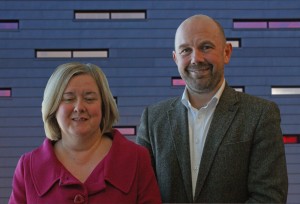23 January, 2013, by Francine Pickering
Bringing New Products and Services to Market
Speakers: Dr. Deborah Roberts, Nottingham University Business School and Matt Hague, Director of Microlise, transport management specialists“Don’t compromise, and do it as quick as you can” was Matt Hague’s advice as he spoke about his experience of bringing new products and services to market. He had plenty of other insights to share too but, first, Debbie Roberts guided us through the Pentathlon Model of Innovation Management developed at Cranfield University. We were to hear some of her themes later from Matt.
The Pentathlon Model, unsurprisingly, identifies five areas in which a business must succeed to bring new products to market.
Innovation strategy – this ensures that any new product development is in line with the business strategy. It involves assessing market trends and the role of new technologies.
Ideas – essential to innovation, whether that means “new to the world” products or additions and improvement to existing products and lines. It depends on the business fostering a culture of creativity, on tapping into internal and external sources of ideas (innovation is not just about a solitary inventor in a lab), and on mapping out future scenarios.
People and organisations – the culture of a business makes a real difference to its ability to innovate. Risk taking must be acceptable and coupled with an ethos of recognition and reward.
Prioritisation – coming up with new ideas is all well and good but there needs to be a system in place to assess costs and benefits and check on the strategic fit.
Implementation – there needs to be a fast and efficient model of implementing innovation – “Don’t compromise, and do it as quick as you can” – with a focus on a strong market launch and delivery.
The critical success factors for new product development are:
- Product advantage – a well differentiated product with unique benefits and superior customer value.
- Marketing factors – understanding the customer and a well-planned and resourced launch.
- Organisation factors – a process with tough go/kill decision points.
- Strategic factors – a match with long-term objectives with plenty of up-front work to define the product.
- Managerial factors – using cross-functional teams and project champions.
Product differentiation was high on Matt’s list of priorities too. Microlise focus on providing and demonstrating excellent value for their customers – with technology such as smart phones opening up the market to free-to-use alternatives on a basic level, their products must be superior in ways that are simply inarguable.
For Matt, a new product and its wrap-around service must be:
Customer focused with proven benefits – one new development has cut a very large client’s speeding and accident rate by 90%. As Matt says, in a crowded market there is nowhere to hide so clear and measurable benefits are essential.
Integrated and modular – giving customers a choice and a chance to build on that choice as their needs develop.
Consultative in approach – this leads to new business and to new ideas; remember Debbie’s note about ideas coming from within and outside the business.
Constantly innovative – in this market it is vital to bring new technology to market every year; not to do so would mean falling behind, not standing still.
Incrementally innovative – not every innovation that a customer values has to be totally new to the world. Small changes can make a significant difference in terms of customer value.
The right people are essential for Microlise too. The company is recruiting developers regularly to keep pace with the business’ growth and the right calibre is vital to ensure that they adapt to their agile way of working.
Matt’s last piece of advice to the audience was to take regular note of the things you do well. It’s all too easy to get bogged down in your own business’ internal issues and lose sight of the fact that, actually, your products are well received. Take a step back occasionally and congratulate yourselves.
“The presentations applied to all types of business.”
“Stimulating and understandable – a balance of academic and industry.”
“Matt’s presentation was first rate – it was good to hear from somebody doing it for real.”
The Ingenuity Knowledge Exchange breakfasts are free and open to all business owners. The next event is on the theme of “Thinking Fast and Slow – the implications for business risk” and sees Professor Steve Diacon from Nottingham University Business School return to the Ingenuity stage accompanied by commercial contracts specialist, Margaret Burrell from Contract Clarity.
Download Debbie and Matt’s presentations.


Really enjoyed bringing new products and services to market presentations from academia and industry, great balance. Follow my link to my news blogs in the context of my business.
Here is the second article. Follow my link to my news blogs in the context of my business.
Very refreshing and well structured presentation and points. I thoroughly enjoyed it and will be using it within my own business practices. Looking forward to the next one.